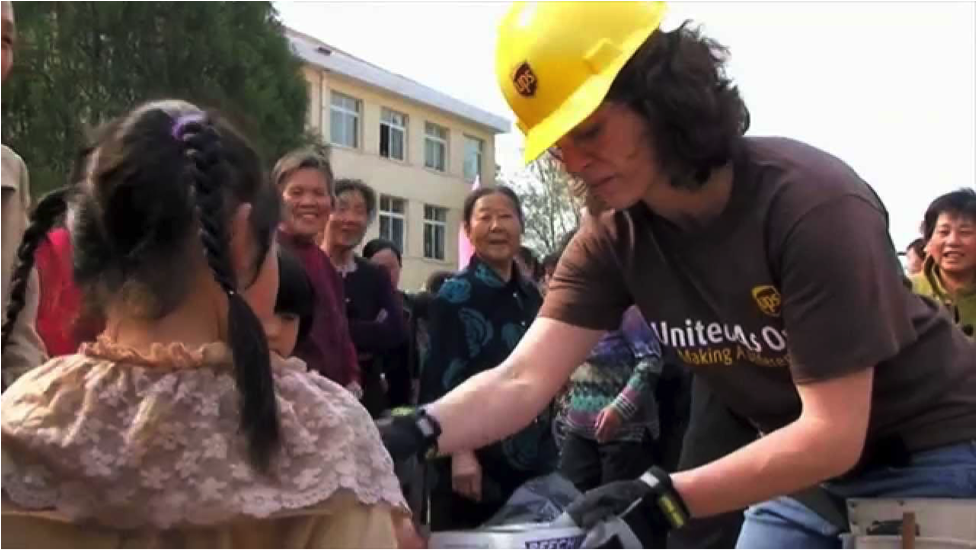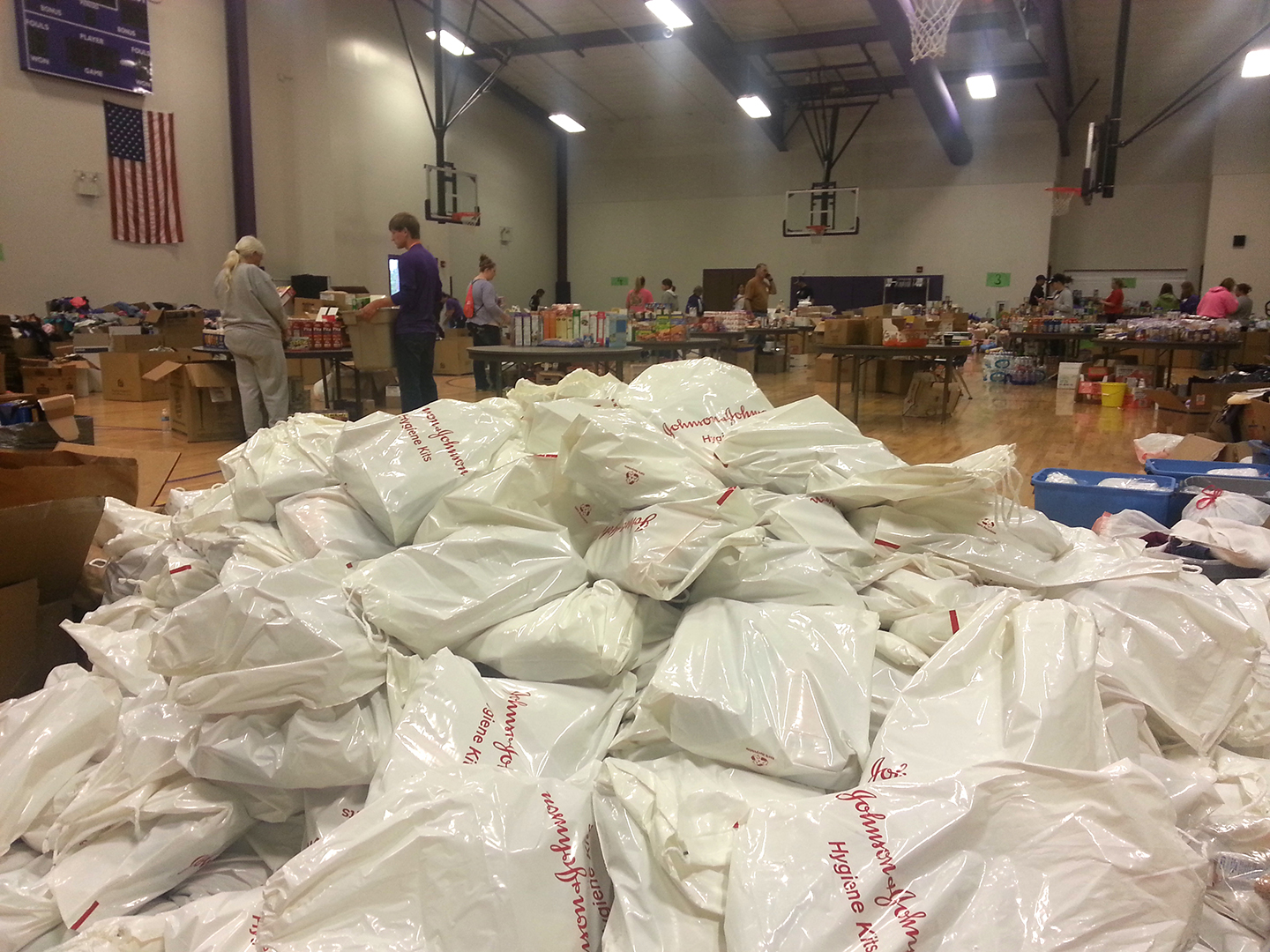Disaster Philanthropy Playbook

Product Donations
Introduction
Product donations from corporations and corporate foundations are extremely valuable, especially when they are received by impacted populations when the need is greatest. These life-saving items consist of food, water, shelter, clothing, medical supplies and pharmaceuticals. Critical donations from corporations also consist of in-kind services and include transportation, logistics coordination, healthcare delivery and training. These products and services are essential and can close the gaps in meeting immediate relief and long-term needs not met by FEMAFederal Emergency Management Agency, HUDFederal Office of Housing and Urban Development, and other philanthropic support.
Disaster recovery is about bringing a community back to life and it makes sense that corporations have a vital and unique role to play in helping communities return to a state of safety, normalcy and ultimately resiliency.
Innovative Practices
As the frequency and intensity of natural disasters and wide-scale emergencies increases, and as government resources are stretched thin, communities are turning more and more to corporations to assist in immediate relief and long-term recovery efforts. Corporations possess high skilled talent, innovative resources, and cutting-edge technology that can help prepare their community to be more resilient and also save a community from a downward spiral post-disaster.
Important actions and strategies corporations have implemented include:
- Donations of goods and services that are in alignment with the company’s mission;
- Food and clean drinking water
- Medicine and medical supplies
- Clothing
- Logistics coordination and tracking
- Telecommunications
- Electric and Gas power
- Fuel for machinery
- Focus on restoring power, safety, communications, and transportation for first-responders and emergency management and relief personnel first; this enables those critical workers to assist the community at-large;
- Create initiatives that allow employees to put their best skills to use before, during and after a disaster;
- Establish and manage employee-giving campaigns;
- Establish and manage employee-volunteer programs;
- Offer training and workshops to small business and nonprofit community on disaster preparedness, business continuity planning, and disaster response and recovery.

What Funders Are Doing
The following are examples of innovative practices and grants that philanthropic organizations have supported, developed and/or implemented related to product donations.
Product donations from corporations and corporate foundations are extremely valuable, especially when received by those impacted when the need is greatest.
The following examples are part of the Center for Disaster Philanthropy’s COVID-19 Response Fund:
- Airlink received $150,000 to coordinate aviation response for supplies to prevent, contain and address the effects of the pandemic on countries in Africa, Latin America and the Caribbean.
- The Center for Rural Strategies received $80,000 to support the reporting of The Daily Yonder on the impact of COVID-19 on rural communities nationally and in targeted states. The goal is to help fill information gaps so that citizens and policymakers are aware of special conditions affecting rural communities.
- Farm Share was awarded $75,000 to deliver fresh food to families in need throughout Florida. Farm Share connects family farmers with those who need but cannot afford fresh food.
- Good360 received $100,000 to support the distribution, storage and sourcing of needed products for communities and nonprofits. This group manages the supply chain of needed products during a disaster for community organizations and to meet the basic needs of individuals.
- National Association of Free & Charitable Clinics received $200,000 supporting the expansion of telehealth, providing testing and equipment, expanding access to medication and providing operational and technical assistance to their member clinics in the most vulnerable locations.
Also related to COVID-19 response are these examples:
- The Kraft Heinz Company donated $4.7 million in products to Feeding America member food banks to support food security during COVID-19.
- The BD Corporate Giving Program donated $300,000 in products including catheters, flush products, syringes, sharps and blood collection tubes to the Chinese Red Cross Foundation to support two new COVID-19 military hospitals in Wuhan.
- Google.org pledged $340 million in Google Ads credits available to all small- and medium-sized businesses with active accounts over the past year in response to the coronavirus pandemic.
- Facebook provided $5,000 total in non-expiring Facebook ad credits to those in the San Francisco Chinese American and immigrant community who want it. Facebook also will provide free advertisements to the World Health Organization (WHO) in an attempt to keep misinformation about the coronavirus on its platform at bay.
Other examples have included:
- Outland Denim donated $20,700 (AUD 30,000) worth of jeans to Thread Together for relief after the Australian Bushfires in 2019-2020.
- International Aid received 10,000 toothbrushes, valued at approximately $8,000 from Perrigo to be used in hygiene kits for families who lost their homes or were evacuated due to Hurricane Dorian.
- During the 2018 Atlantic Hurricane Season, the FedEx Corporation donated $1 million in cash, in-kind shipping and logistics support to nonprofit organizations providing immediate relief and long-term recovery efforts in the aftermath of Hurricane Florence. The UPS Foundation donated $1 million to Hurricane Harvey and $1.5 million to Hurricane Michael for the same type of in-kind shipping and logistics support.
- In 2018, Foster Farms donated $25,000 in cooked chicken products to be distributed directly to families affected by the Camp Fire.
Key Takeaways
- Get engaged with disaster preparedness and response by providing the goods, services and/or skills that your organization is known for. Integrate your disaster response program with your company’s mission and values.
- Healthy businesses depend upon healthy and safe communities.
- Communities will thrive when the business community invests time, expertise, products, services, volunteerism and many other intangibles that yield significant future dividends.
- Site visits to impacted communities are important because the business leaders can see the damage first-hand and determine how they can best assist.
- Remember to leverage your expertise, resources and partners for an efficient, equitable and comprehensive recovery.